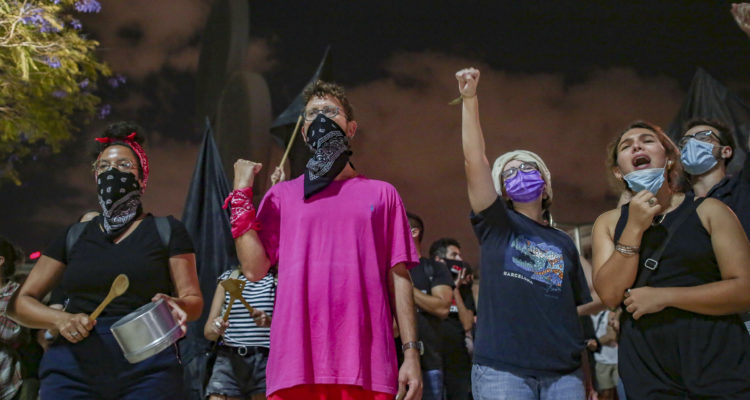Thousands of Israelis returned to protesting the current government after the sabbath as the first day of the Sukkot holiday came to a close on Saturday night.
By World Israel News and AP
Israelis celebrated the festival of Sukkot under harsh lockdown restrictions instituted in response to skyrocketing coroanvirus rates.
While the new law prohibits protesters from demonstrating more than one kilometer from their places of residence, and requires social distancing, people throughout Israel continued to protest publicly on Saturday night, calling on Prime Minister Benjamin Netanyahu to resign over his response to the pandemic and the charges he faces on corruption allegations.
On Friday tourism minister Asaf Zamir resigned from the fractious government, saying he doesn’t have an “ounce of trust” in Prime Minister Benjamin Netanyahu and accusing him of putting his personal and legal issues ahead of the response to the coronavirus crisis.
Zamir is a member of the Blue and White Party, which battled Netanyahu’s Likud in three stalemated elections in under a year before forming an emergency government with it in May to combat the pandemic.
Israel went into a second nationwide lockdown last month and is now grappling with one of the worst outbreaks in the world on a per capita basis. The emergency government has been roiled by infighting and has faced widespread criticism over its confusing and often contradictory response to the pandemic.
“I can no longer sit in a government in which I don’t have an ounce of trust in the person at its head,” Zamir tweeted. “I have unfortunately determined that the coronavirus crisis and its terrible impact is at best in second place in the list of priorities of the prime minister. Personal and legal considerations are at the top of Netanyahu’s priorities.”
Netanyahu has been the target of weekly demonstrations outside his official residence for months, with protesters calling on him to resign over his trial on multiple corruption allegations and his response to the pandemic.
Earlier this week, Israel’s parliament passed a law that would allow the government to curtail public protests during the lockdown, as Netanyahu’s critics accused him of trying to muzzle dissent. Netanyahu says the restrictions are needed to prevent transmission of the virus.
The Likud slammed Zamir’s decision to step down, accusing him of playing politics at a time when Netanyahu is “fighting around the clock in order to save the lives and the livelihoods of Israeli citizens.”
“Blue and White needs to decide if they are working in unison within the government in fighting the coronavirus or if they are continuing to create chaos within the government and therefore harm the necessary actions for the sake of Israeli citizens.”
Israel garnered praise last spring when it moved quickly to seal its borders, close most businesses and impose strict stay-at-home orders. By May the rate of new daily cases had dropped to around a dozen.
But that month authorities abruptly reopened the economy, lifting nearly all restrictions. Case numbers have soared since then, with the country now reporting more than 7,000 new infections a day and authorities warning that hospitals could soon be overwhelmed. The economy has meanwhile been slow to recover.
Israel, with a population of just 9 million, has reported a total of more than 250,000 cases and more than 1,600 deaths.
Defense Minister Benny Gantz, the head of Blue and White, said he accepted Zamir’s resignation with “understanding and regret,” adding that “we wanted unity, and yet this isn’t the government we hoped for.”
“We joined the government to reign in the coronavirus, not to curb democracy or the rule of law,” he said. “If anyone disagrees, they can set a date for elections.”





